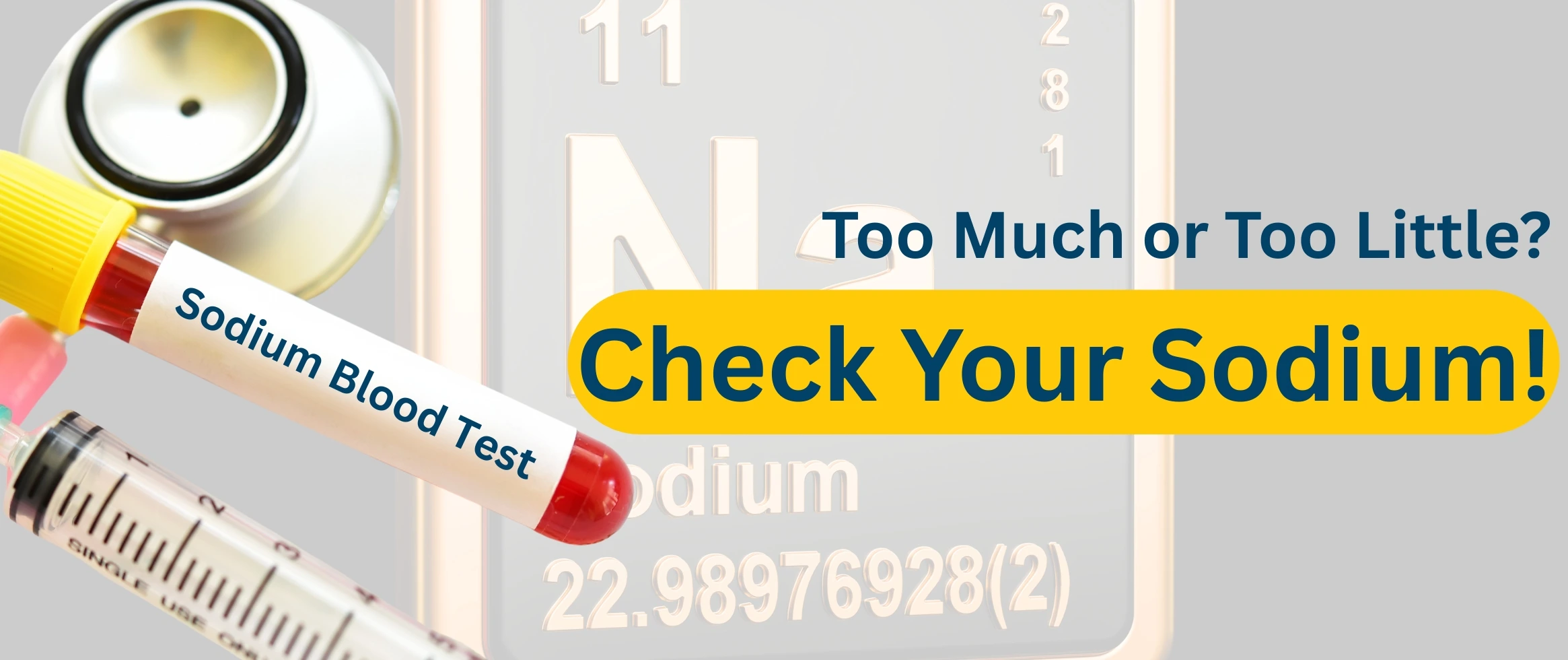Sodium is an electrolyte, which are minerals that the body needs in relatively high amounts. When electrolytes dissolve in bodily fluids such as blood, they acquire an electric charge. In the blood and the fluid surrounding cells the majority of sodium in the body is seen. Sodium aids the body in maintaining appropriate fluid balance (see About Body Water). Sodium is essential for appropriate neuron and muscle function. The body gets salt through food and drinks and loses it mostly through perspiration and urine. Healthy kidneys keep the salt level in the body stable by controlling the amount discharged in the urine. The complete amount of sodium in the body is disturbed when sodium intake is out of balance.
The overall sodium content of the body influences the quantity of fluid in the blood (blood volume) and around cells. Blood volume and salt levels are continually checked by the body. When either becomes too high, sensors in the heart, blood arteries, and kidneys detect the changes and trigger the kidneys to enhance salt excretion, restoring normal blood volume. The sodium blood test determines the amount of sodium in the blood. A urine test can also be used to determine sodium levels.
Sodium Test Overview
Sodium is an electrolyte, which are minerals that the body needs in relatively high amounts. When electrolytes dissolve in bodily fluids such as blood, they acquire an electric charge. In the blood and the fluid surrounding cells the majority of sodium in the body is seen. Sodium aids the body in maintaining appropriate fluid balance (see About Body Water). Sodium is essential for appropriate neuron and muscle function. The body gets salt through food and drinks and loses it mostly through perspiration and urine. Healthy kidneys keep the salt level in the body stable by controlling the amount discharged in the urine. The complete amount of sodium in the body is disturbed when sodium intake is out of balance.
The overall sodium content of the body influences the quantity of fluid in the blood (blood volume) and around cells. Blood volume and salt levels are continually checked by the body. When either becomes too high, sensors in the heart, blood arteries, and kidneys detect the changes and trigger the kidneys to enhance salt excretion, restoring normal blood volume. The sodium blood test determines the amount of sodium in the blood. A urine test can also be used to determine sodium levels.
What Is a Sodium Blood Test?
One test to examine the electrolytes in your body is the sodium blood test also called as serum sodium test. The neuro-muscular functions are brought on by sodium, an essential electrolyte found in your bodily fluid. It also controls how much fluid is present in the body and aids in the body's cell activity. Your doctor can recommend an electrolyte or sodium test if you have symptoms that point to a brain, lung, heart, kidney, or adrenal gland problem. A sodium blood test is a common method that allows your doctor to regulate the level of salt in your blood. Sodium is a mineral your body needs.
Frequently, the Sodium test is a series of examinations that check the levels of other blood constituents, such as:
- An electrolyte panel, chemistry panel, or chem 7 are other names for a basic metabolic panel (BMP), which is also known as a Chem 7. It measures blood electrolytes, blood glucose levels, and the acid-base balance in your body.
- A complete metabolic panel (CMP) evaluates liver function and blood protein levels in addition to electrolytes. Sodium is essential for facilitating the transmission of electrical information between cells and regulating the body's fluid balance. For your cells to function properly, your body requires it.
Who Needs a Sodium Test?
Your doctor may suspect either a high or low sodium level in you if you show specific symptoms. You can be unable to reason, confused, or forgetful. Your doctor may also keep an eye out for the following signs:
- Achy or cramping muscles
- Walking issues
- Vomiting
- Fatigue
- Breathing difficulty
- Headaches
- Often thirsty
- Inflammation or fluid accumulation in specific body parts
- Insufficient urination
- Looseness of the bowels
- Paleness
- Sleeping issues (insomnia)
- Misperception
If you have symptoms of a sodium imbalance or if you're at risk of developing one, your doctor may recommend a test.
Preparation and Procedure of Sodium Test
Before the test, there is no specific preparation needed. No need to change your diet or fast. You may consume your regular diet and as much water as you desire. When the doctor instructs you to cease taking a prescription or medication, you should heed his or her advice. One of the most crucial things to do for reliable outcomes is to follow instructions. For the test, one should dress comfortably in sleeveless or half-sleeve shirts so that the doctor can collect the sample with ease.
Your doctor might advise you to temporarily cease taking any medications that could interfere with the test. These consist of:
- Antibiotics \Antidepressants
- Certain medications for high blood pressure
- Nonsteroidal anti-inflammatory medications with lithium (NSAIDs)
- Water tablets (diuretics)
Before speaking with your practitioner, do not stop taking any medications.
Serum (preferred) or plasma is used for the sodium test. The sodium test is a component of the basic metabolic panel or electrolyte panel. A blood sample is taken and submitted to the lab for additional tests. The specimen is stored in, a gel-barrier, green-top or red-top (lithium heparin) tubes.
- You wipe the needle and your skin with alcohol or another disinfectant.
- Your elbow's upper portion is covered in an elastic band to make the veins more noticeable.
- After injecting the needle into the visible vein, a tube linked to the needle is used to collect the blood sample.
- The tube containing the sample is labelled with your name and delivered to the lab for additional examination.
How To Understand Sodium Test Results?
Normal Levels
Salt levels in the blood should be between 135 and 145 milliequivalents per litre (mEq/L). The different labs may have somewhat different normal value ranges. Some labs test various samples or use various metrics. Ask your provider what your particular test results signify.
Understanding abnormal levels
Numerous causes might cause an abnormal sodium level. Hypernatremia is a sodium level that is higher than normal. It might result from:
- Difficulties with the adrenal glands like Cushing disease or hyperaldosteronism
- A type of diabetes in which kidneys are not able to conserve water called Diabetic Insipidus
- Increased fluid loss brought on by diarrhoea, heavy perspiration, or burns
- Having a diet high in sodium bicarbonate or salt
- Consuming several drugs, such as corticosteroids, laxatives, lithium, and drugs like ibuprofen or naproxen.
Hyponatremia refers to a sodium level that is lower than usual. It might result from:
- Inadequate hormone production by the adrenal glands (Addison disease)
- waste products from fat breakdown accumulate in urine (ketonuria)
- blood sugar level is high (hyperglycaemia)
- Blood triglyceride lever is high (hypertriglyceridemia)
- Heart failure, some kidney disorders, or liver cirrhosis are all associated with an increase in total body water.
- Increased bodily water loss, vomiting, or diarrhoea.
- Syndrome of inefficient antidiuretic hormone release (the antidiuretic hormone is released from an abnormal place in the body).
- Excessive levels of the hormone vasopressin.
- Low thyroid activity (hypothyroidism).
- Intake of drugs including morphine, diuretics (water tablets), and selective serotonin reuptake inhibitor (SSRI) antidepressants.
- If you are at risk for hyponatremia and are suffering nausea, headaches, cramping, or weakness, call your doctor right once. Your doctor might advise getting immediate medical attention based on the severity and length of these symptoms.



 NABL approved
NABL approved  Most Trusted by
Most Trusted by  Accuracy &
Accuracy &  Widest Range
Widest Range 















_KnowCauses,Symptoms,Diagnosis&Treatment(1)21042505030738.webp)
